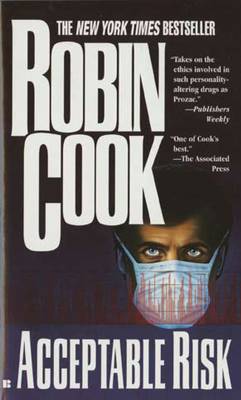
Door een staking bij bpost kan je online bestelling op dit moment iets langer onderweg zijn dan voorzien. Dringend iets nodig? Onze winkels ontvangen jou met open armen!
- Afhalen na 1 uur in een winkel met voorraad
- Gratis thuislevering in België vanaf € 30
- Ruim aanbod met 7 miljoen producten
Door een staking bij bpost kan je online bestelling op dit moment iets langer onderweg zijn dan voorzien. Dringend iets nodig? Onze winkels ontvangen jou met open armen!
- Afhalen na 1 uur in een winkel met voorraad
- Gratis thuislevering in België vanaf € 30
- Ruim aanbod met 7 miljoen producten
Zoeken
Omschrijving
The bestselling "master of the medical thriller" (The New York Times) confronts one of the most compelling issues of our time: personality-altering drugs and the complex moral questions they raise. When neuroscientist Edward Armstrong begins dating Kimberly Stewart, a descendant of a woman who was hanged as a witch at the time of the Salem witch trials, he takes advantage of the opportunity to delve into a pet theory: that the "devil" in Salem in 1692 had been a hallucinogenic drug inadvertently consumed with mold-tainted grain. In an attempt to prove his theory, Edward grows the mold he believes responsible with samples from the Stewart estate. In a brilliant designer-drug transformation, the poison becomes Ultra, the next generation of antidepressants with truly startling therapeutic capabilties. But who can be sure the drug is safe for consumers? Who defines the boundaries of "normal" human behavior? And if the drug's side effects are proven to be dangerous--even terrifying--how far will the medical community go to alter their standards of acceptable risk?
Specificaties
Betrokkenen
- Auteur(s):
- Uitgeverij:
Inhoud
- Aantal bladzijden:
- 400
- Taal:
- Engels
- Reeks:
Eigenschappen
- Productcode (EAN):
- 9780425151860
- Verschijningsdatum:
- 1/02/1996
- Uitvoering:
- Paperback
- Formaat:
- Mass market (rack) paperback
- Afmetingen:
- 106 mm x 171 mm
- Gewicht:
- 185 g

Alleen bij Standaard Boekhandel
+ 26 punten op je klantenkaart van Standaard Boekhandel
Beoordelingen
We publiceren alleen reviews die voldoen aan de voorwaarden voor reviews. Bekijk onze voorwaarden voor reviews.











